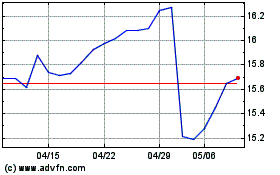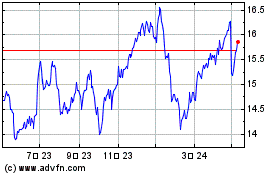France's Engie Backs Out of U.S. LNG Deal
2020年11月4日 - 6:03AM
Dow Jones News
By Collin Eaton and Sarah McFarlane
French power company Engie SA has halted negotiations on a
multibillion-dollar contract to import U.S. liquefied natural gas,
raising alarms in the American energy industry that environmental
concerns could limit the foreign market for the fuel.
Engie didn't provide details about the proposed LNG deal with
NextDecade Corp., which was reportedly a $7 billion, 20-year
contract, or the reason it canceled talks with the Houston-based
exporter.
Last month, Politico and French news outlet La Lettre A reported
that the French government, which owns about 24% of Engie, had
pushed Engie to delay or cancel the deal over concerns about the
environmental and climate impact of fracking, and related emissions
of methane, a potent greenhouse gas.
France's Ministry of the Economy and Finance didn't immediately
respond to a request for comment.
NextDecade is courting potential customers for its proposed Rio
Grande LNG export facility in Brownsville, Texas, which it has said
could have the capacity to export 27 million metric tons of LNG a
year. NextDecade, which is planning to make an investment decision
on the project next year, didn't respond to requests for
comment.
Mike Sommers, chief executive of the trade group American
Petroleum Institute, called the move a misguided decision by the
French government. He said the group believes global demand is
still strong for American shale gas, which enables the nation's
international allies to wean themselves off of energy supplies from
countries that "may be hostile to democratic interests."
"In over 35 countries from Asia to Europe, American natural gas
is already helping to reduce emissions and enabling increased
energy security," Mr. Sommers said.
Engie's deal has long been opposed by some environmental groups.
Lorette Philippot, private finance campaigner at the French branch
of environmental group Friends of the Earth, applauded Engie and
the French government's move as an explicit acknowledgment of the
climate and environmental costs of extracting natural gas through
fracking.
"This method of extraction creates disastrous effects on climate
because of methane emissions," she said.
Many American oil and gas companies are voluntarily moving to
reduce leaks of methane -- which is a more powerful greenhouse gas
than carbon dioxide -- from oil and gas facilities amid concerns
that the emissions could harm efforts to export the fuel around the
world. But the oil and gas industry has been divided over whether
to support stronger regulations.
Some bigger companies including Exxon Mobil Corp. and Royal
Dutch Shell PLC have warned the Trump administration that failure
to enact tougher regulations could weaken the argument that gas is
a cleaner fuel. But some smaller independent companies have pushed
back against regulations due to concerns about the costs. The Trump
administration moved this summer to roll back Obama-era rules on
methane emissions from oil and gas facilities.
Write to Collin Eaton at collin.eaton@wsj.com and Sarah
McFarlane at sarah.mcfarlane@wsj.com
(END) Dow Jones Newswires
November 03, 2020 15:48 ET (20:48 GMT)
Copyright (c) 2020 Dow Jones & Company, Inc.
Engie (EU:ENGI)
過去 株価チャート
から 3 2024 まで 4 2024

Engie (EU:ENGI)
過去 株価チャート
から 4 2023 まで 4 2024
